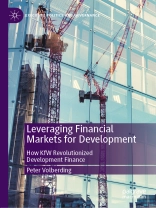This book investigates how development institutions created and promoted marketized development financial instruments to increase the speed and scope of assistance by leveraging private financial markets for development objectives. To attract private investors, donor governments agreed to bear the risk in these new instruments in order to mobilize investment during times of political crisis. In particular, this book contends that Germany’s Kf W played an outsized role in the development of these new financial instruments, particularly in microfinance banks and structured funds, as Kf W’s unique institutional attributes and strong political support from the German government at critical junctures fostered financial innovation. Using over 70 interviews and a cache of newly released archival materials, this books documents how Kf W and other development institutions created and promoted these marketized development financial instruments, and how they have become a pillar of modern development policy.
สารบัญ
Chapter 1. The Marketization of Development Finance.- Chapter 2. 1950-1970: The World Bank, DFCs, and the Foundations of Private Investment Mobilization.- Chapter 3. 1970 to 1990: Development Finance in Crisis and the Search for a New Paradigm.- Chapter 4. Kf W and the Early Stages of Marketized Development Financial Instruments. Chapter 5. Chapter 5: The Maturation of Marketized Development Financial Instruments: Microfinance and Structured Funds.- Chapter 6. The Scaling-Up of Marketized Development Financial Instruments from 2005 to 2017.- Chapter 7. Conclusion and Future Directions.
เกี่ยวกับผู้แต่ง
Peter Volberding received his Ph D from the Government Department at Harvard University, USA. His research focuses on the intersection between public institutions and private financial markets, and is co-author of a forthcoming edited volume on European development banking. He currently lives and works as a consultant in New York City.












